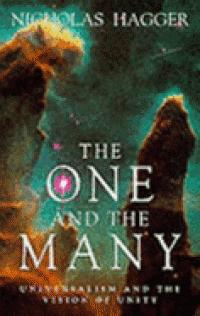Published by Element in 1999
ISBN 1862045321
Price: £9.99/$16.95 (Canada $23.99) Paperback
Publisher’s Outline
The One and the Many has three parts:
In part 1 Nicholas Hagger outlines the metaphysical universe and challenges the materialistic outlook.
In part 2 he redefines the place of Universalism in philosophy and challenges the direction of contemporary philosophy and approaches a Theory of Everything.
In part 3 he challenges our secular culture. His challenge to humanism is the work of a philosopher rather than a cultural historian; he sees Western culture as debilitated by the Vienna Circle’s debunking of metaphysics, and restores its vitality by bringing in a new pro-metaphysical philosophy.
Appendix 1 includes two interviews with Nicholas Hagger about Universalism and the Metaphysical Revolution.
Appendix 2 is on the background to the world government.
In The One and the Many Nicholas Hagger presents a Universalist view of Western culture for the 21st century, and advocates a renewal of the metaphysical vision that inspired our civilization. Calling for a revolution in thought and culture, he shows how secular humanism has led to intellectual stagnation and the loss of mankind’s high designs.
This work questions the tradition of philosophy since 1910, when promising developments were obliterated by damaging materialistic philosophy, and through Universalism offers an exciting way forward for contemporary philosophy.
The Back Cover Says
In The Universe and the Light Nicholas Hagger defined a new philosophy of Universalism, explaining the nature of the metaphysical Light and the origin of the Universe. The work’s unitive vision linked the individual to the greater Whole, and was hailed as a welcome antidote to the reductionist science of Stephen Hawking and the materialist philosophy of the twentieth century.
In The One and the Many Hagger expounds the One metaphysical reality which governs and reveals the underlying unity of Everything (the Many) in the context of culture, history, philosophy and religion. In doing so he makes an impassioned plea for a civilization inspired by a renewed vision of the divine Fire or Light. He demonstrates how secular humanism has led to a dead-end in all the disciplines, and outlines his hopes and fears for future world government which will operate either on Universalist benevolent principles or as an anarchic global empire run by big business.
New approach
Nicholas Hagger’s books reveal truths that have been hidden. His philosophical Universalism brings a new approach to philosophy.




